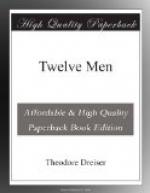“Once he became angry at my uncle,” his daughter once told me, “because he offered to collect for him for three per cent, dunning his patients for their debts, and another time he dissolved a partnership with a local physician who insisted that he ought to be more careful to charge and collect.”
This generosity on his part frequently led to some very interesting results. On one occasion, for instance, when he was sitting out on his front lawn in Warsaw, smoking, his chair tilted back against a tree and his legs crossed in the fashion known as “jack-knife,” a poorly dressed farmer without a coat came up and after saluting the doctor began to explain that his wife was sick and that he had come to get the doctor’s advice. He seemed quite disturbed, and every now and then wiped his brow, while the doctor listened with an occasional question or gently accented “uh-huh, uh-huh,” until the story was all told and the advice ready to be received. When this was given in a low, reassuring tone, he took from his pocket his little book of blanks and wrote out a prescription, which he gave to the man and began talking again. The latter took out a silver dollar and handed it to the doctor, who turned it idly between his fingers for a few seconds, then searched in his pocket for a mate to it, and playing with them a while as he talked, finally handed back the dollar to the farmer.
“You take that,” he said pleasantly, “and go down to the drug-store and have the prescription filled. I think your wife will be all right.”
When he had gone the doctor sat there a long time, meditatively puffing the smoke from his cob pipe, and turning his own dollar in his hand. After a time he looked up at his daughter, who was present, and said:
“I was just thinking what a short time it took me to write that prescription, and what a long time it took him to earn that dollar. I guess he needs the dollar more than I do.”
In the same spirit of this generosity he was once sitting in his yard of a summer day, sunning himself and smoking, a favorite pleasure of his, when two men rode up to his gate from opposite directions and simultaneously hailed him. He arose and went out to meet them. His wife, who was sewing just inside the hall as she usually was when her husband was outside, leaned forward in her chair to see through the door, and took note of who they were. Both were men in whose families the doctor had practiced for years. One was a prosperous farmer who always paid his “doctor’s bills,” and the other was a miller, a “ne’er-do-well,” with a delicate wife and a family of sickly children, who never asked for a statement and never had one sent him, and who only occasionally and at great intervals handed the doctor a dollar in payment for his many services. Both men talked to him a little while and then rode away, after which he returned to the house, calling to Enoch, his old negro servant, to bring his horse, and then went into his study to prepare his medicine case. Mrs. Gridley, who was naturally interested in his financial welfare, and who at times had to plead with him not to let his generosity stand wholly in the way of his judgment, inquired of him as he came out:




